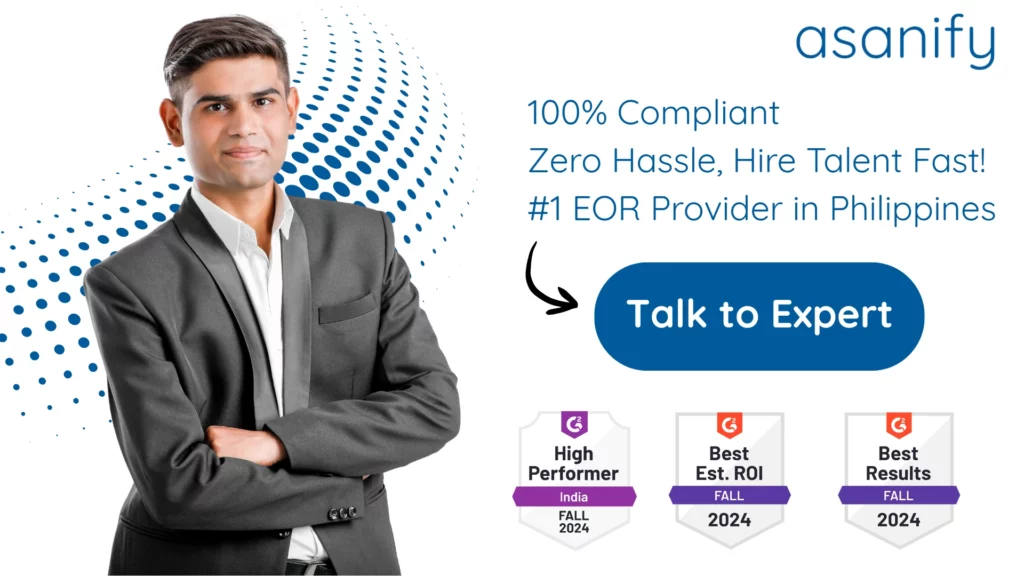Whether you’re an international employer hiring in the Philippines or a local employee working under a standard employment contract, understanding how to optimize compensation is crucial to maximizing take-home pay. In 2025, focusing on Employee Tax Optimization allows both employers and employees to leverage non-taxable benefits, proper salary structuring, and voluntary contributions for higher net income.
While the Philippines does impose personal income tax on salaries, there are still several effective and legally compliant strategies to structure compensation for better net outcomes—especially when using an Employer of Record (EOR) model.
This comprehensive 2025 guide explores practical ways to enhance salary packages through optimized structuring, non-cash allowances, and strategic tax planning, all while staying fully compliant with Philippine labor laws and Bureau of Internal Revenue (BIR) regulations. Employers and employees alike can leverage these approaches to increase net income, improve retention, and maintain full statutory compliance.
Table of Contents
- Overview of Tax Optimization for Employees
- Tax Optimization Impact on Take-Home Salary in the Philippines
- Example Salary Structure & Tax Calculation
- List of Tax-Saving Mechanisms in the Philippines
- Utilizing Family and Dependent Deductions
- SSS, PhilHealth, Pag-IBIG & Voluntary Contributions
- Tax-Free Allowances and Fringe Benefits
- Tax Deductions and Non-Taxable Benefits in the Philippines
- Conclusion
- FAQs
Overview of Tax Optimization for Employees
The Philippines’ progressive personal income tax system and mandatory statutory contributions mean that employees do not retain their full gross pay. Optimizing compensation requires careful planning to minimize the impact of these deductions while staying fully compliant with Philippine labor and tax laws.
Key factors that influence compensation structuring and net salary optimization include:
- Income tax withholding based on BIR’s graduated tax rates
- Mandatory contributions to SSS (Social Security System), PhilHealth, and Pag-IBIG Fund
- 13th-month pay and other legally required benefits
- Non-taxable allowances such as de minimis benefits and government-approved fringe benefits
- Compliance with local labor regulations on leaves, overtime, and holiday pay
Employers, particularly those hiring through an Employer of Record (EOR), can strategically structure salary and benefits to reduce tax liabilities, maximize non-taxable perks, and ensure higher net take-home pay for employees while fully adhering to Philippine labor laws.
Tax Optimization Impact on Take-Home Salary in the Philippines
Even with strategic tax planning, a poorly structured compensation package in the Philippines can lead to lower net pay for employees and compliance risks for employers. Effective optimization involves:
- Minimizing taxable income by strategically balancing basic salary with non-taxable allowances
- Providing non-cash or de minimis perks (e.g., meal subsidies, company events, small gifts) that improve employee satisfaction without increasing tax liabilities
- Allocating allowances for transportation, communication, and meal benefits within BIR-approved thresholds to reduce withholding tax impact
- Ensuring all salary and benefit components are properly declared in the employment contract and reflected in SSS, PhilHealth, and Pag-IBIG contributions for full statutory compliance
Non-compliance or unclear salary structuring in the Philippines can trigger BIR audits, SSS/PhilHealth/Pag-IBIG penalties, and labor disputes, while also reducing employee satisfaction and retention.
Example Salary Structure & Tax Calculation
Let’s examine how a typical salary package in the Philippines can be structured to maximize take-home pay while staying compliant with Philippine labor and tax regulations.
Scenario: Local Employee with PHP 150,000 Monthly Total Compensation
| Component | Amount (PHP) | Notes |
|---|---|---|
| Basic Salary (60%) | 90,000 | Used as the basis for SSS, PhilHealth, and Pag-IBIG contributions |
| Transportation Allowance | 15,000 | Can be partially non-taxable if within BIR’s de minimis limits |
| Meal / Rice Subsidy | 10,000 | Non-taxable if within approved de minimis thresholds |
| Communication Allowance | 8,000 | Can be structured as partially non-taxable with proper documentation |
| 13th Month Pay (prorated) | 12,500 | Mandatory; exempt from tax up to PHP 90,000 annually |
| Medical & HMO Coverage | Provided | Employer-funded health plans are generally non-taxable |
| Training / Education Allow. | 5,000 | Non-taxable if job-related and properly documented |

Benefits of This Structure:
- Optimized Tax Impact: A mix of basic pay and BIR-approved non-taxable benefits reduces the taxable base.
- Enhanced Take-Home Pay: De minimis and fringe benefits increase net income without additional income tax.
- Full Statutory Compliance: SSS, PhilHealth, and Pag-IBIG contributions are accurately computed on the basic salary while all allowances are properly documented to withstand audits.
List of Tax-Saving Mechanisms in the Philippines
Employees can save on taxes using a mix of exemptions, deductions, and special contributions:
- Personal and additional exemptions under TRAIN Law
- De minimis benefits (rice subsidy, clothing allowance, medical cash, etc.)
- SSS, PhilHealth, and Pag-IBIG contributions
- Voluntary savings like Pag-IBIG MP2
- Employer-sponsored fringe benefits
- Donations to BIR-accredited charities
- Educational and medical expense support (in limited cases)
Suggested Read: Employer of Record Philippines: A Comprehensive Guide
Utilizing Family and Dependent Deductions
Although the Philippines has limited traditional tax relief schemes, employers can offer family-friendly incentives through strategic salary packaging, such as:
- Dependent medical and HMO coverage with maternity and dental options
- Educational assistance or tuition reimbursement for employee dependents
- Transportation and meal allowances extended to support family needs
- Company-sponsored wellness and family programs (e.g., family days, small gifts, or recreational benefits)
These benefits enhance employee satisfaction and loyalty, particularly for professionals balancing work and family responsibilities. When structured within BIR’s non-taxable and de minimis limits, such perks also optimize take-home pay and serve as effective retention tools in competitive industries.
SSS, PhilHealth, Pag-IBIG & Voluntary Contributions
In the Philippines, employees are required to make mandatory contributions to the Social Security System (SSS), PhilHealth, and the Pag-IBIG Fund. These deductions are automatically taken before income tax is computed, which helps reduce the taxable income.
To further optimize compensation, employees can take advantage of voluntary contributions, particularly to Pag-IBIG MP2 (Modified Pag-IBIG 2). This program offers higher dividend rates, tax-free earnings, and follows a five-year compounding cycle, which makes it a valuable tool for building savings. If contributions are properly documented and reported, they are typically excluded from gross taxable income, providing both immediate tax relief and long-term financial growth.
Key Pointers for Employees:
- Mandatory SSS, PhilHealth, and Pag-IBIG contributions are pre-tax, reducing taxable income.
- Pag-IBIG MP2 allows voluntary, tax-free, and compounded savings.
- Proper documentation and payroll reporting ensure compliance and audit readiness.
- Voluntary contributions can increase take-home pay efficiency and enhance long-term savings.
Tax-Free Allowances and Fringe Benefits
Fringe benefits like de minimis benefits are excluded from taxable income. Examples:
- Rice subsidy (up to PHP 2,000/month)
- Uniform/clothing allowance (PHP 6,000/year)
- Medical cash allowance (PHP 1,500/semester)
- Employee achievement awards (PHP 10,000/year)
Correctly applying these in salary packages can help reduce the taxable base.

Tax Deductions and Non-Taxable Benefits in the Philippines
Optimizing take-home pay in the Philippines involves understanding which expenses are tax-deductible and which benefits are non-taxable when structured correctly. Below are the key categories:
Health Insurance and Medical Expenses
- Employer-paid group health insurance is non-taxable.
- Self-paid health premiums are deductible only for self-employed individuals or under itemized deductions.
Rental Expenses and Deduction Possibilities
- Rental expenses are not deductible for salaried employees.
- Self-employed individuals or business owners can claim them under itemized deductions.
- Employees should explore non-taxable housing allowances provided by their employer.
Standard Deduction and No Tax Zone
- Under the TRAIN Law, the first PHP 250,000 of annual income is tax-exempt for all employees.
- Self-employed individuals can opt for 8% flat tax or 40% Optional Standard Deduction (OSD) depending on income type.
Travel and Relocation Deductions
- Employer-paid relocation or travel reimbursements for work are non-taxable.
- Self-paid relocation costs are not deductible for employees but may qualify for itemized deductions if self-employed.
Home Loan Interest Deductions
- There is no employee deduction for home loan interest in the Philippines.
- Employers may offer housing support or subsidies to structure this more tax-efficiently.
Charitable Donations
- Donations to BIR-accredited NGOs are deductible up to 10% of taxable income.
- Always secure an official receipt for compliance.
Savings and Investment Income
- Interest from bank deposits and investments is taxed at 20% final withholding tax.
- Pag-IBIG MP2 and some government bonds offer tax-free or preferential returns.
Education Expenses & Student Loan Interest
- Tuition fees and student loans are not broadly deductible for employees.
- Employer-sponsored educational assistance may be tax-exempt if properly structured as a fringe benefit.

Medical Expenses for Critical Illnesses
- Salaried employees cannot deduct personal medical expenses.
- Self-employed individuals may claim these under itemized deductions.
- Employer-sponsored support or insurance payouts for critical illnesses are generally non-taxable.
Suggested Read: Understanding Labour Laws in the Philippines: Contracts, Wages, and Termination Rules
Conclusion
While the Philippines imposes income tax and mandatory contributions, a well-structured compensation package can significantly maximize take-home pay and improve employee satisfaction. Leveraging non-taxable allowances, BIR-approved de minimis perks, Pag-IBIG MP2 contributions, and full compliance with SSS, PhilHealth, and Pag-IBIG regulations ensures both financial efficiency and regulatory security.
Whether you manage payroll internally or partner with an Employer of Record (EOR) provider like Asanify, creating a legally optimized salary structure helps employers reduce tax impact, stay compliant, and boost retention, while giving employees the highest possible net pay under Philippine tax laws.
FAQs
Pag-IBIG MP2 contributions grow tax-free and are generally excluded from gross taxable income if properly documented.
No, home loan interest is not deductible for employees; only businesses may claim it under itemized deductions.
Employees automatically enjoy a PHP 250,000 no-tax threshold and mandatory contributions reduce taxable income.
Employer-paid group insurance is non-taxable, but self-paid premiums are not deductible for employees.
Key reliefs include the PHP 250,000 no-tax zone, non-taxable allowances, and BIR-approved de minimis benefits.
Yes, donations to BIR-accredited NGOs are deductible up to 10% of taxable income with official receipts.
Use non-taxable allowances, de minimis perks, Pag-IBIG MP2 contributions, and ensure proper payroll documentation.
Employer-provided HMO, educational assistance, and dependent benefits can be structured as non-taxable perks.
The first PHP 250,000 of annual income is tax-exempt under the TRAIN Law.
No direct deductions exist, but medical or HMO coverage for dependents can be a non-taxable benefit.
Regular interest is taxed at 20% final tax, but Pag-IBIG MP2 and some government bonds offer tax-free earnings.
Not to be considered as tax, legal, financial or HR advice. Regulations change over time so please consult a lawyer, accountant or Labour Law expert for specific guidance.

